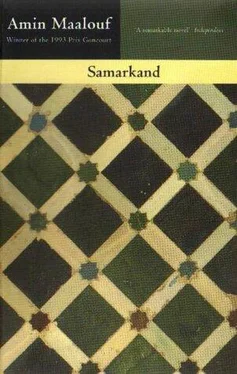Omar retorted:
‘One life-time, three or seven, I would pass them all just like this one, stretched out on this terrace with my hand in your hair.’
Together, and different. Lovers for nine years, married for four years and their dreams still did not live under the same roof. Jahan devoured time, Omar sipped it. She wanted to rule the world and had the ear of the Sultana who had the ear of the Sultan. By day she intrigued in the royal harem, intercepting incoming and outgoing messages, alcove rumours, promises of jewels and the stench of poison — all of which excited, agitated and inflamed her. In the evening she would give herself up to the happiness of being loved. For Omar, life was different. It was the pleasure of science and the science of pleasure. He would arise late, take the traditional ‘morning glass’ on an empty stomach, then settle down at his work table to write, calculate, draw lines and figures, write more, and transcribe a poem in his secret book.
At night, he would go off to the observatory built on a hillock near his house. He only had to cross a garden in order to be in the midst of the instruments which he cherished and caressed, oiled and polished with his own hand. Often he was accompanied by some astronomer who was passing through. The first three years of his stay had been devoted to the Isfahan observatory. He had supervised its construction and the manufacture of the equipment. Most importantly he had instituted the new calendar, ceremonially inaugurated on the first day of Favardin 458, 21 March 1079. What Persian could forget that year, when due to Khayyam’s calculation the sacrosanct festival of Nowruz had been displaced, and the new year which ought to have fallen in the middle of the sign of Pisces had been held off until the first day of Aries, and that since that reform the Persian months have conformed to the signs of the zodiac with Favardin thus becoming the month of Aries and Esfand that of Pisces? In June 1081 the inhabitants of Isfahan and the whole Empire were living out the third year of the new era. This officially carried the name of the Sultan, but in the street, and even in certain documents, it was enough to mention ‘such and such year in the era of Omar Khayyam’. What other man has known such honour in his lifetime? While Khayyam, at the age of thirty-three, was a renowned and respected personage, he was doubtless feared by those who did not know of his profound aversion to violence and domination.
What was it that kept him close to Jahan in spite of everything? A detail, but a gigantic detail: neither of them wanted children. Jahan had decided, once and for all, not to burden herself with offspring. Khayyam had made his the maxim of Abu al-Ala, a Syrian poet he venerated: ‘My suffering is the fault of my progenitor, let no one else’s suffering be my fault.’
Let us not be mistaken about this attitude, Khayyam had none of the makings of a misanthropist. Was it not he who had written: ‘When unhappiness overwhelms you, when you end up wishing for an eternal night to fall on the world, think of the greenery which springs up after the rain, think of the awakening of a child.’ If he refused to father children, it was because existence seemed to him to be too heavy to bear. ‘Happy is he who has never come into the world,’ he never ceased proclaiming.
It was clear that the reasons both of them had for refusing to give life to a child were not one and the same. She acted out of an excess of ambition, he out of an excess of detachment. However, for a man and a woman to be closely drawn together by an attitude condemned by all the men and women of Persia, and to give free reign to rumours that one or the other was sterile without even deigning to respond was what, at that time, forged an imperative complicity.
However, it was a complicity which had its limits. With Omar, Jahan generally came to learn the valuable opinion of a man who coveted nought, but she rarely took the trouble of informing him of her activities. She knew that he disapproved of them. What good would it do to feed endless quarrels? Of course, Khayyam was never far from the court. Even though he avoided becoming embroiled in it, despised and fled from all the intrigues, particularly those which had always worked against the palace doctors and astrologers, he nevertheless had some inescapable obligations, such as being present sometimes at the Friday banquet, examining a sick Emir and above all providing Malikshah with his taqvim , his monthly horoscope, the Sultan being, just like everyone else, constrained to consult it to know what he should do or should not do every day. ‘On the 5th, a star is lying in wait for you, do not leave the palace. On the 7th, neither be bled nor take any sort of potion. On the 10th, wind your turban the other way. On the 13th, do not approach any of your wives …’ The Sultan never thought to transgress these directives, and nor did Nizam, who received his taqvim from Omar’s hand before the end of the month, read it greedily and followed it to the letter. Gradually, other personages acquired this privilege, the chamberlain, the Grand Qadi of Isfahan, the treasurers, certain Emirs of the army and some rich merchants, which ended up meaning considerable work for Omar and took up the ten last nights of every month. People were so partial to predictions! The luckiest consulted Omar. The others found themselves a less prestigious astrologer, unless they went to a man of religion for every decision. Closing his eyes, and opening the Quran at random, he would place his finger on a verse which he would read aloud to them so that they could find therein the answer to their worries. Some poor women, in a great hurry to make a decision, would go out into a public square and would interpret the first phrase they heard as a directive from Providence.
‘Terken Khatoun asked me today if her taqvim for the month of Tir is ready,’ Jahan said that evening.
Omar looked out into the distance:
‘I am going to prepare it for her during the night. The sky is clear and none of the stars are hidden. It is time for me to go to the observatory.’
He readied himself to stand up, without hurry, when a servant came to announce:
‘There is a dervish at the door. He is asking for hospitality for the night.’
‘Let him come in,’ said Omar. ‘Give him the small room under the stairway and tell him to join us for the meal.’
Jahan covered her face ready for the entrance of the stranger, but the servant came back alone.
‘He prefers to stay and pray in his room. Here is the message he gave me.’
Omar read it and blushed. He arose like an automaton. Jahan was worried:
‘Who is this man?’
‘I shall return.’
He tore the message into a thousand pieces, strode towards the little room and shut the door behind him. There was a moment of waiting and then of incredulity, an accolade followed by a reproach:
‘What have you come to Isfahan for? All Nizam al-Mulk’s agents are after you.’
‘I have come to convert you.’
Omar stared at him. He wanted to make sure that Hassan still had all his wits about him, but Hassan laughed, the same muffled laugh that Khayyam had recognized in the caravansaray in Kashan.
‘You can be reassured that you are the last person I would think of converting, but I need shelter. What better protector could there be than Omar Khayyam, companion to the Sultan, friend to the Grand Vizir?’
‘Their hatred for you is greater than their friendship for me. You are welcome under my roof, but do not think for a moment that my relations with them could save you if your presence were suspected.’
‘Tomorrow I shall be far away.’
Omar appeared distrusting:
‘Have you come back for revenge?’
Читать дальше












